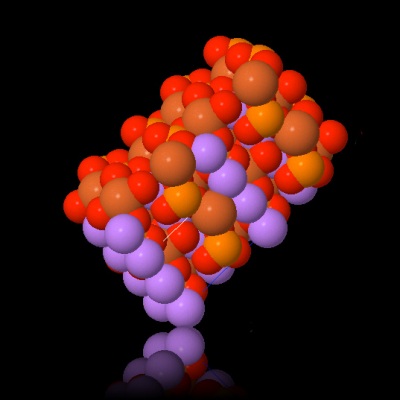A study by Martin Z. Bazant from the Massachusetts Institute of Technology (MIT) has discovered the reasons behind the unusual charging and discharging behavior of lithium iron phosphate (LiFePO4) nanoparticles, paving the way to develop high-efficient battery materials.
 The molecular structure of lithium iron phosphate (LiFePO4)
The molecular structure of lithium iron phosphate (LiFePO4)
According to Bazant’s theory, beyond a critical current, the LiFePO4 nanoparticles do not entertain phase separation that occurs at lower power levels, due to increased reaction rate. The nanomaterials cross a unique ‘quasi-solid solution’ state near the critical current and thus do not have time to finish the phase separation. These qualities are helpful in defining the suitability of the material for rechargeable batteries, Bazant added.
Earlier studies of the LiFePO4 nanoparticles did not investigate the dynamics of their characteristics. Here, Bazant and Daniel Cogswell investigated the changes in the material when it is used, for instance, during charging or discharging a battery.
It was widely believed that lithium steadily soaks to enter into the particles, resulting in the formation of a shrinking lithium-poor material core at the center. Here, the MIT team discovered that the lithium creates straight parallel lithium-rich bands inside every particle and these bands pass through the particles as they get charged up. However, separation does not occur at all, either in layers or in bands at higher electric-current levels, but the lithium is soaked up by each particle all at once, thus instantaneously shifting from lithium-poor to lithium-rich.
Besides explaining the performance of LiFePO4, these findings are helpful in describing its durability. The boundaries of stripes of different phases act as a strain source, causing cracking and thus degrading the performance of the material. However, when the entire material changes immediately no such boundaries are created, resulting in less degradation. Moreover, Bazant and Cogswell believe that working at a little higher temperature may make the substance last longer, which is against normal material behavior. These characteristics of the nanoparticles can only be witnessed at their actual nano-scale, Bazant concluded.
The research findings will be published in ACS Nano.
Source: http://web.mit.edu